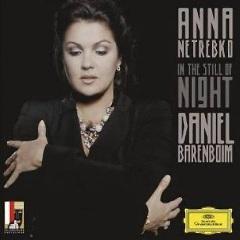Anna Netrebko – In The Still Of Night (2010)
Anna Netrebko – In The Still Of Night (2010)

Rimsky-Korsakov
1. O Chem V Tishi Nochey Op. 40 No. 3 What It Is, In The Still Of Night
2. Prosti! Ne Pomni Dney Naden'ya Op. 27 No. 4 Forgive Me! Remember Not The Downcast Days
3. Ne Veter, Veya Sïsotï Op. 43 No. 2 It Was The Wind, Blowing From The Hights
4. Zvonche Zhavoronka Pen'ye Op. 43 No. 1 The Lark's Song Rings More Clearly
5. Na Kholmakh Gruzii Op. 3 No. 4 On Georgia's Hills
6. V Tsarstvo Rozï Vina Op. 8 No. 5 In The Realm Of Roses And Wine
7. Pesnya Zyuleyki Op. 26 No. 4 Zuleika's Song
8. Plenivshis' Rozoy, Solovey (Vostochnïy Romans) Op. 2 No. 2 Captivated By The Rose, The Nightingale
9. Redeyet Oblakov Letuchaya Gryada Op. 42 No. 3 The Line Of Flying Clouds Grows Thin
10. Nimfa Op. 56 No. 1 The Nymph
11. Son V Letnyuyu Noch' Op. 56 No. 2 Dream On A Summer's Night
Tchaikovsky
12. Skazhi, O Chom V Teni Vetvey Op. 57 No. 1 Say: When Under Shady Boughs
13. Zabït Tak Skoro (1870) So Soon Forgotten
14. Nochy Bezumnïye Op. 60 No. 6 Reckless Nights
15. Otchevo? Op. 6 No. 5 Why?
16. Serenada Op. 63 No. 6 Serenade
17. Kolïbel'naya Pesnya Op. 16 No. 1 Lullaby
18. Ya Li V Pole Da Ne Travushka Bïla Op. 47 No. 7 Was I Not A Stem Of Grass In The Field?
19. Sred Mrachnïkh Dnei Op. 73 No. 5 Amidst Gloomy Days
20. Den Li Tsarit? Op. 47 No. 6 Amidst The Reign Of Day
Encores
21. Als Die Alte Mutter Op. 55 No. 4-Dvořák
22. Cäcilie Op. 27 No. 2-Richard Strauss
Anna Netrebko (soprano),
Daniel Barenboim (piano).
This was the concert event of the Salzburg Festival 2009.
In the second album soprano Anna Netrebko has devoted to music of her native Russia, she turns to songs by Rimsky-Korsakov and Tchaikovsky, most of which are little known in the West. The two composers were close friends, and in spite of occasional musical differences, admired and respected each other's work. It's easier to hear their musical kinship in these songs than in their large orchestral works and operas. The songs by Rimsky-Korsakov, who is familiar largely through his picturesque orchestral works, are most revelatory. They are rooted in folk traditions, without directly quoting folk sources, and besides their emotional directness and clarity, they are notable for their sophistication, delicacy, and lyrical grace. Tchaikovsky's songs, while similar in many ways, are more overtly romantically emotional, and their vocal writing is more virtuosic. In their heightened sense of drama, some have an operatic quality, and their accompaniments are exceptionally subtle and expressive. Netrebko and pianist Daniel Barenboim are very much equal musical partners in the endeavor, both in the selection of the repertoire and in the acute musicality of their performances. There are two non-Russian encores, ravishing performances of a selection from Dvorák's Songs My Mother Taught Me and Richard Strauss' Cäcilie. The recording captures a live performance at the 2009 Salzburg Festival. Netrebko is in absolutely top form, singing with an enveloping, velvety warmth, and soaring with a radiant intensity. Her beautifully controlled and nuanced vibrato is always used with a keen sensitivity to the drama inherent in the texts, and her interpretations are driven by her gift for communicating with her audience. Barenboim's accompaniments are so shapely and subtly shaded that they could hold the listener rapt even without the vocal line. The sound of Deutsche Grammophon's album is vividly present, with a lively acoustic and minimum audience noise, except for the applause, whose riotous enthusiasm is a happy reminder of what must have been genuine electricity between the performers and listeners. --- Stephen Eddins, Rovi
download (mp3 @192 kbs):
yandex mediafire ulozto gett bayfiles
Zmieniony (Środa, 12 Sierpień 2020 09:11)








